Section 3: LITHUANIA TODAY
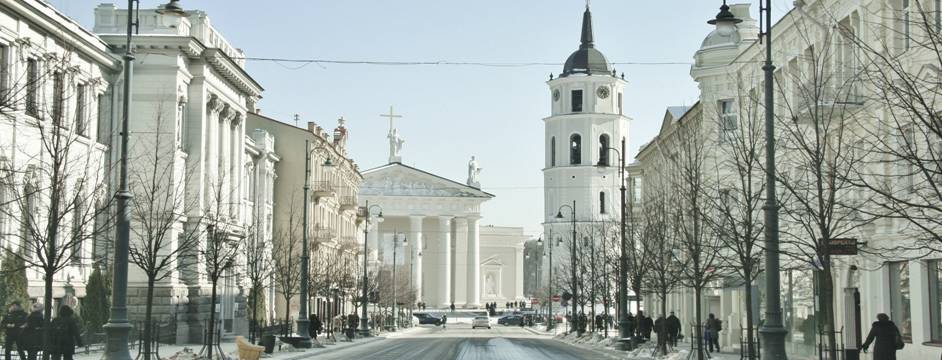

THE VOICE OF INTERNATIONAL LITHUANIA
|
VilNews has its own Google archive! Type a word in the above search box to find any article.
You can also follow us on Facebook. We have two different pages. Click to open and join.
|
Sat, 16th July, 2011 - (2) Comment

Text: Aage Myhre
aage.myhre@VilNews.com
Klaipeda, the one and only Lithuanian coastline city, is called “the jewel in the amber crown,” a term that truly suits it, although to Lithuanians living inland the city is largely regarded as simply being the country’s port on the Baltic Sea.
Yet Klaipeda, which has a venerable history dating back to 1252, is far more than that. The sea, as a commercial port and as a replenishing source of food, sustains Klaipeda’s prosperity, but vistas of the sea add to the city’s beauty, and the scent of the sea that spices the air is a health-restoring elixir that quickens the step.
We fell in love with Klaipeda on a recent weekend, and we hope that what he found will inspire you to visit this modern, maritime, melting pot of over 150,000 inhabitants. It’s a destination that you are certain to enjoy.
The 300-kilometer, divided motorway from Vilnius to Klaipėda must be the easiest superhighway to drive in all of Europe, with very little traffic on the four lanes. So, if motoring from Vilnius, simply turn on your cruise control and enjoy a relaxing, three-hour trip through scenic rural views and undulating forest vistas on your way west. For those without wheels, there’s a deluxe, express bus that connects the two cities, and should you live abroad, you can fly from a number of European cities direct to Palanga, just thirty kilometers from Klaipėda.
It quickly struck us that the look of Klaipėda differs from the inland Lithuanian cities, as it shows the influence of Germanic architecture of the Hanseatic period, with many lattice-work buildings that reflect its Prussian past. Klaipėda was formerly called Memel, which is also the German name for the Nemunas River. In contrast, Klaipeda -- its present Lithuanian name -- reflects what the terrain of this city probably looked like on its founding some 760 years ago, for Klaipeda derives from the word “klaipė pėdas,” meaning “marshy footprint.”

Sat, 16th July, 2011 - (2) Comment
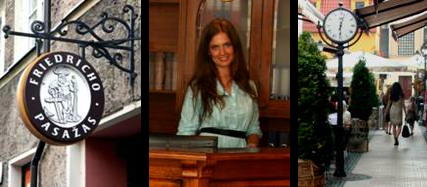
Friedricho Pasažas (Friedrich Passageway, also called Friedrich Town) – is a truly unique oasis in downtown Klaipėda (located at Tiltų Street 26a, near the city’s old market).
According to historic documents, during the rule of Friedrich III, during the period 19-29 June 1692, this place received official permission given by the citizens to be called Friedrichsstadt (Friedrich Town) based on an act from 1639. On 9 June 1707 Friedrichsstadt received its own coat of arms which on one side features a male figure with a wreath of oak leaves, whereas the other side contains the intertwined initials FR (Friedrich Rex – King Friedrich) under a crown.
It is in the Friedricho Pasažas that you might find yourself asking; “Is this really Lithuania?” Because once you enter this cozy and lively courtyard, you will feel as if you are in a world of its own, and you will soon find yourself ready to sit down and relax, try freshly prepared fish or meat dishes, exotic salads, pizzas, or simply sip some wine or coffee.
Sat, 16th July, 2011 - (2) Comment

The above illustration is from the web page
http://www.bork-on-line.de/Memel/index.htm
This web page includes very much interesting
information about Klaipeda (Memel) of those days!
In the early 1200s, the Teutonic Knights (‘Order of Brothers of the German House of Saint Mary in Jerusalem’) started building a castle in the Pilsāts Land of the Curonians and named it Memelburg; later the name was shortened to Memel.
From 1252-1923 and from 1939–1945, the town and city was officially named Memel. Due to political changes between 1923 and 1939, both names were in official use; since 1945 the Lithuanian name of Klaipėda is used.
The names Memelburg and Memel are found in most written sources from the 13th century onwards, while Klaipėda is found in Lithuania-related sources since the 15th century. The first time the city was mentioned as Caloypede in the letter of Vytautas in 1413, for the second time in the negotiation documents of 1420 as Klawppeda, and for the third time in the Treaty of Melno of 1422 as Cleupeda. According to Samogitian folk etymology, the name Klaipėda refers to the boggy terrain of the town (klaidyti=obstruct and pėda=foot). Most likely the name is of Curonian origin and means "even ground": „klais/ klait“ (flat, open, free) und “ped“ (sole of the foot, ground).
Sat, 16th July, 2011 - (2) Comment
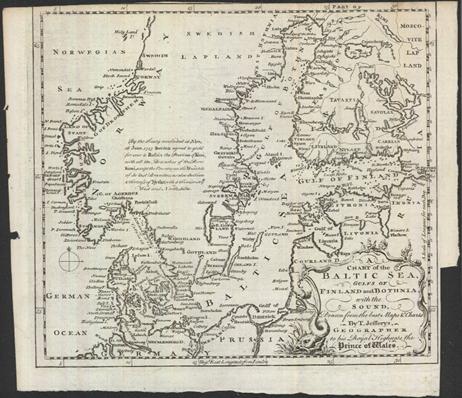
1748
"A Chart of the Baltic Sea, Gulfs of Finland and Bothnia, with the Sound, Drawn from the Best Maps & Charts by T. Jefferys, Geographer to His Royal Highness the Prince of Wales"
The Baltic Sea was known as the Mare Suebicum or Mare Sarmaticum at the time of the Roman Empire.
Since the Viking age, the Scandinavians have called it "the Eastern Lake", but Saxo Grammaticus recorded in Gesta Danorum an older name Gandvik, "-vik" being Old Norse for "bay", which implies that the Vikings correctly regarded it as an inlet of the sea.
In the early Middle Ages, Vikings of Scandinavia fought for power over the sea with Slavic Pomeranians. The Vikings used the rivers of Russia for trade routes, finding their way eventually all the way to Black Sea and southern Russia.
Wed, 13th July, 2011 - (2) Comment

Above: Map of 48 major shale gas basins in 32 countries
As soon as year 2012, Lithuania may start works with test drills for shale gas with a private investor. Lithuania has 480 billion cubic metres of shale gas which could produce 100 billion cubic metres of gas, geologists say.
Energy Minister Arvydas Sekmokas disclosed last month that he had held talks with a U.S. company about beginning shale natural gas production in Lithuania.
According to a statement issued by the Lithuanian Energy Ministry, "Major companies are ready to invest on condition of clear bilateral obligations, which shall be assumed both by the state and the production companies," the Baltijos Naujienos Akcijos news agency reported.
Shale natural gas production has become an increasingly contentious practice in the United States because of environmental concerns, highlighted in the 2010 documentary "Gasland," which contains imagery of landowner concessionaires igniting water from their faucets, claiming that its produced by shale production pollution, a charge the industry strongly denies.
Sekmokas' contact is the second U.S. firm to express interest in Lithuania, as last month he met with representatives of the U.S. shale gas producer Cheniere.
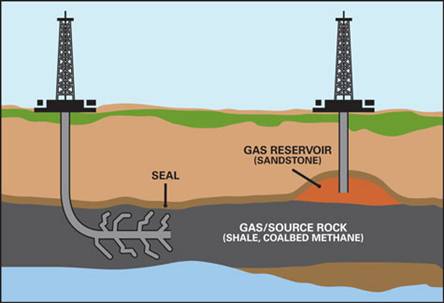
Prepared by: dr. Stasys Bačkaitis, P.E., SAE Fellow
In the last few years, the world's gas markets have and are still experiencing a revolution. Thanks to the newly developed U.S. technology, that allows drilling into shale formations and breaking them apart for extraction of gas, knowledge on how to tap into such gas resources became available to any country in the world. -This process, allowed the United States today to supply more than 23% of its internal gas needs and increase it to 40% in approx. 5-6 years. U.S. success, led many other countries to start searching for and extracting gas in their own territories. The result is a substantial decline in gas prices. Increased supply of gas and its transportation in liquefied form have become so plentiful that the United States, which had previously imported it, now began its massive export. Gas reserves are expected to increase globally in the foreseeable future at least 4% per year.
Fri, 1st July, 2011 - (0) Comment
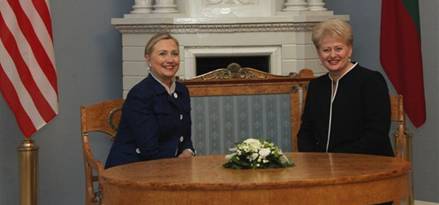
U.S. Secretary of State Hillary Clinton at same table in the Presidential Palace in Vilnius with Lithuanian President Dalia Grybauskaite yesterday.
Thursday, June 30, Vilnius - President Dalia Grybauskaitė thanked all of the participants from around the world who came to the Vilnius high-level conference "Women Enhancing Democracy: Best Practices" for their thoughts and ideas inspiring to work even harder for ensuring women full-fledged life.
The President underlined that such intense focus from the international community on the conference showed the great significance of the problems discussed. She pointed out that the stories told and the proposals made for enabling women to seek education, careers, self-protection from violence and discrimination had encouraged all to make even greater efforts and to better coordinate their activities.
"I am convinced that even in the digital age not a single of these projects would be effective if not rooted deep in the heart or implemented with love and commitment. There is no device to replace human activity and compassion," the President said.
According to Dalia Grybauskaitė, the good practices enhancing women's rights that will spread around the world from Vilnius, the new information heard and the new aspects noted at the conference will inspire active women to fresh endeavors and projects and will make them even more determined in actions towards improving the status of women worldwide.
Lithuanian Prime Minister Andrius Kubilius after the event said that the participation of US Secretary of State Hillary Clinton was of "immense importance".
"The US’s support through the whole 21 years of our independence, including our aspirations to become a NATO member, an EU member, to create our security, develop economic ties, energy independence, all these ties remain very important, and, of course, a conversation with Secretary of State Clinton in this respect is of immense importance," he said in an interview with News Radio.…
Fri, 1st July, 2011 - (0) Comment
![]()
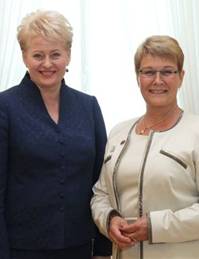
President Dalia Grybauskaitė and Swedish Minister for
Enterprise and Energy, Maud Olofsson
President Dalia Grybauskaitė this week had a meeting with Swedish Minister for Enterprise and Energy, Maud Olofsson.
Issues discussed at the bilateral meeting included energy security, building of the NordBalt power bridge between Lithuanian and Sweden, construction of a LNG terminal in Lithuania, and opportunities for closer cooperation within the NB8 framework.
The President and the Swedish Minister agreed to intensify cooperation towards timely implementation of all EU decisions related to energy security and towards securing proper financing for vital projects.
"The power bridge to Sweden will integrate Baltic electricity networks into the Nordic power market and will ensure our country's and region's energy independence and security. It will also contribute to the establishment of the EU internal market without ‘energy islands', which makes Lithuania's energy projects significant for the whole Europe," the President said.
The President thanked Sweden for its continuous support for Lithuania in its efforts to ensure energy independence, and the Swedish Minister promised further support for Lithuania on issues of highest concern: safety of nuclear power plants underway in the Lithuanian neighborhood and swift implementation of electricity and gas connections to Poland.…
Wed, 22nd June, 2011 - (0) Comment
Kernavė is a unique five mounds complex, honoured as being the first capital of Lithuania almost a 1000 years ago. The first settlers appeared here as early as in 9th-8th millennium BC, in the Epipaleolithic period. Since then until the very Early Middle Ages, the territory was continuously settled by people who left their traces. In written sources Kernavė was first mentioned in 1279 in the Livonian Chronicle and the Herman Vartberg Chronicle, where it was described as Grand Duke Traidenis’, the Great Duke’s of Lithuania, estate (1269-1282). At that time Kernavė was the most significant economic-political centre of Lithuania. In 1390 Kernavė was burnt in an attack by Crusaders. After the fire the wooden town and castles was never rebuilt, and the remaining residents moved to the top of the hill instead of staying in the valley.
In later years, the remains of the city were covered with an alluvial earth layer, that formed wet peat. It preserved most of the relics intact, and it is a treasure trove for archaeologists, leading some to call Kernavė the "Troy of Lithuania". For example, Kernavė has the oldest known medgrinda, a secret underwater road paved with wood. The road was used for defense and dates from the 4–7th centuries.
Kernavė is world known for its annual celebration of Joninės – Lithuania’s famous midsummer festival dating back to the pagan times, and since 1967 also for its traditional Rasa festival. For several decades this festival was not only a way to clean the soul, but also to protest against the humiliation of national consciousness and the forced implantation of Soviet traditions. Attempts to prohibit this festival were not successful.
Kernavė is famous for national celebrations of King Mindaugas (1200-1263) coronation day on 6 July. On that day a festival is held, where medieval authentic crafts, war games and folk music are presented. The craftsmen come from around the Baltics and neighboring countries.
Mon, 20th June, 2011 - (4) Comment
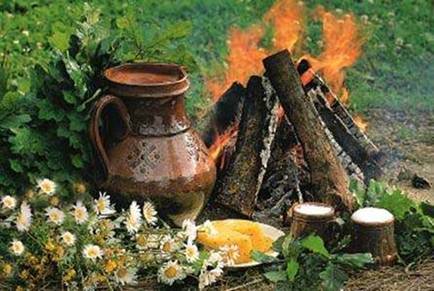
Midsummer Day in Lithuania is a celebration of the Summer Solstice as well as being a holy day sacred to St. John. The real festivities take place on the evening, prior to the date itself, which is 24th of June. That night, throughout Lithuania, people come together to celebrate Saint Jonas' Festival, also known as Jonines, Kupolines or Rasos.
Things you'll need for your "Joninės"
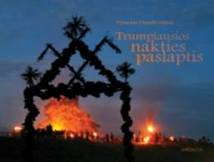 |
1. Outdoor party place 2. Fresh flowers and herbs 3. Floral garlands for unmarried females 4. Fire pit or candles 5. Lithuanian music 6. Book of Lithuanian folktales 7. Lithuanian foods and beverages 8. Silk handkerchief 9. Access to flowing water (if possible) |
Step 1
Select an outdoor place in which to hold your party. Decorate your party space with fresh flowers and, if possible, raise a pole covered with flowers and herbs. Make garlands of fresh flowers and ribbons to be worn by all of the young girls and unmarried women present.
Step 2
Build a bonfire if at all possible. Lithuanian tradition calls for a tall pole crowned with a wooden wheel that has been soaked in tar or filled with birch bark, but you may have to make do with a small fire built in a fire pit or even candles. Whichever form of fire you use, if there is a member of your party named John, Jonas, or another similar name, that person should be the one to light it.
Step 3
Play Lithuanian music and encourage guests to sing Lithuanian songs if they know any. Lithuanian folk dances are also traditional, but if you do not know any of the old songs or dances you can still get a book of Lithuanian folk or fairy tales and reads some of them out loud to set the mood.
Step 4
Set out a feast consisting of traditional Lithuanian foods. Kugelis, the baked potato pudding that is the Lithuanian national dish, is pretty much de rigeur, and your guests may also enjoy such dishes as Skilandis (a smoked sausage-type meat), Salti barsciai (a cold soup made from beets), Cepelinai (potato dumplings with a ground meat filling), Vedarai (potato sausage) and Bulviniai Blynai (a type of potato pancake). Poppy seed cakes (Pyragas Su Aguonomis) and honey cakes (Meduoliai) make for an enjoyable, traditional dessert.
Step 5
Look for Lithuanian beers such as Utenos, Svyturys and Kalnapilis, Lithuanian Stumbras vodka, and Anyksciu Vynas wine. If you're the do-it-yourself type, you might like to try brewing up a batch of Lithuanian honey mead (Midus) or even Gira (also known as Kvass), which is made from fermenting this and that, usually bread, but sometimes other items such as barley, cranberries or caraway seeds. Caraway seeds can also be used to brew up a tea for non-drinkers, as can linden blossoms should you be able to acquire any.
Step 6
Take part in special Lithuanian Midsummer traditions like hunting for the magic fern blossom at midnight. This fern blossom, which should be gathered up in a silk handkerchief, is said to make the bearer wise, rich and happy, but is nearly impossible to find as it is guarded by monsters and witches. Another Midsummer game involves having unmarried girls and women float their flower garlands downstream (should you have access to a suitable body of water) to determine the length of time until they get married--the farther their garlands float, the sooner they will marry, supposedly. Yet another custom involves jumping over the bonfire and if the festivities go on all night long, revelers should be sure to wash their faces in the morning dew as they find their way home.
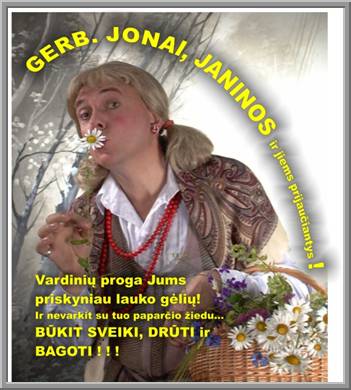
Tue, 7th June, 2011 - (5) Comment

"Lithuania's corrupt media hurts everyone," says a 2007 report from the U.S. Embassy in Vilnius, published by WikiLeaks.
Norwegian Aftenposten tells this week that Lithuania, Bulgaria, Mexico and the Philippines are among the countries where one most easily can buy journalists and editors.
The newspaper refers to a four year old report from the U.S. Embassy in Vilnius, published by WikiLeaks. The report presents a very discouraging picture of the way the Lithuanian media works, and gives concrete examples of how politicians and businesses must pay local media to avoid negative publicity.
Click here to read the WikiLeaks document.
Worse after the financial crisis
"You must buy the right not to be attacked," Vilius Kavaliauskas, long-time journalist and former advisor to the Lithuanian Prime Minister is quoted saying to the Embassy people.
Kavaliauskas, who now works as a freelance journalist, tells Aftenposten that the financial crisis has exacerbated the ethical standards among media in Lithuania.
"It has not become any better since 2007. Many editors and journalists sell and monopolize news and opinions, and there are always questionable political alliances between the media and people in power. Two years ago the media in Lithuania lost its tax exemption. Now they pay 21 percent tax as all other businesses. This has increased the culture of corruption, and is a disaster for our country, "he says.
According to Kavaliauskas the new press laws that were introduced in the middle of the 1990s were inspired by the laws of the Scandinavian countries. "We were on good way, but now we see a total setback," he says.
Pfizer declined 'deal' with Respublika
The embassy document from 2007, which is titled "Lithuania's corrupt media harm everyone, including U.S. industry," says the local director of Pfizer's office in Vilnius, explaining in detail how he was contacted by the owner of the large newspaper Respublika, which offered to "kill" the pharmaceutical manufacturer's competitors in Lithuania.
The price would be one million litas ($ 400,000), and the director was given two weeks' time to respond, it says. When the two weeks had passed, he was again contacted by the newspaper's advertising people, but the director rejected the collaboration.
Shortly after, Respublika started to publish a series of negative articles about Pfizer, which among other things, claimed that several had died from using Viagra, that Pfizer was charging too much for their products, taking advantage of poor hospital patients and sick people.
Discontent over the price difference
The WikiLeaks document published by Aftenposten, also tells about a representative of the Lithuania's Labour Party who claimed that placing a positive article about him in the leading newspaper Lietuvos Rytas would cost 25,000 litas ($ 10,000), whereas a representative of the Social Democrat party would have to pay only 5,000 litas ($ 2,000).
"He was not complaining about paying for an article - he accepted that as common practice. He was complaining that his party had to pay more than another party," is the laconic comment in the embassy message.
Worst in Mexico and the Philippines
-Corruption in the media is common in Eastern Europe, Asia, Africa and Latin America, but absolute worst is now in Mexico and the Philippines, "says Eva Stabell, director of the International Federation of Journalists (IFJ) and responsible for the Norwegian Journalist Team's international work to Aftenposten.
"In these two countries there is a total corruption culture among journalists, incorporated as a part of their payments," she says.
In both countries have a large number of journalists have been killed in recent years.
"Many journalists are on the payroll of the mafia, " she says.
Tue, 31st May, 2011 - (7) Comment
Article 1 of 3

A report published by Associate Professor Aurelijus Gutauskas at Mykolas Romeris University's Law Faculty gives a very interesting insight into how the economic downturn has led to increased social disparities, crime, fraud and widespread shadow economy in Lithuania.
These are some of his findings:
The economic decline will have far-reaching negative effects on the most vulnerable groups in Lithuania unless the government takes additional measures
As in many countries worldwide, the economic downturn in Lithuania has had an adverse impact on national, social, and economic development. The economic decline will have far-reaching negative effects on the most vulnerable groups in Lithuania unless the government takes additional measures to promote employment and provide social protection.
The major negative social consequences of the economic decline in Lithuania are job losses and a decrease in income. These result in rising long-term unemployment, growing social exclusion, and an increase in emigration and the shadow economy.
Criminal offences against the financial system have increased by 47%
The statistical data analysis has shown that during the economic decline the crime rate increased while unemployment rose and household income decreased. Since 2008, the number of recorded criminal offences has been increasing by 6 to 7 per cent annually and reached 83,200 in 2009.
In 2009, the number of recorded criminal offences against the financial system increased by 47 %, and criminal offences related to the possession of narcotic or psychotropic substances increased by 19 %.
The production of counterfeit currency and securities increased by 258.6 % (from 237 to 613 cases) and cases of fraud grew by 59.1 % (from 915 to 1456 cases). Furthermore, the unlawful production of alcoholic beverages and the number of crimes committed by intoxicated persons nearly doubled in 2009. Based on Lithuanian and foreign experience, an increase in crime is expected to continue until 2012–2013 as restraints on economic crimes take longer to implement and are related to a rise in the standard of living in the country.
Lithuania's shadow economy will account for more than 20% of the GDP by 2015
The economic downturn has resulted in an increasing number of businesses experiencing financial difficulties, and some of them turn to the shadow economy as a means of salvation. This is particularly the case in the area of labor relations and in regard to failure to pay taxes (such as income and social insurance taxes). According to official Lithuanian statistics from 2004 and 2008, the shadow economy in Lithuania accounted for about 15 per cent of the GDP. The declining profitability of business entities, the rise in tax rates, and the worsening macroeconomic environment may increase the scope of the shadow economy to 20-22% by 2015.
Younger criminals are taking over the organized crime
The most significant trend within the Lithuanian organized crime community is the shift in power between the older and younger generations. The younger generations are gaining ground and seeking to increase their influence at the expense of older members. Lithuanian OCGs (organized criminal groups) are also aiming to become more interregional within Lithuania.
Smuggling and distribution of drugs and excise good are the most important means for OCGs to gain power. These groups have created an infrastructure in the drug trade and developed channels of supply, as well as networks of distributors, in almost all regions of Lithuania. Even group members who are in prison remain in the drug trade and control it. Smuggling is a strong factor encouraging the creation of new OCGs that specialize in this function.
Free movement of people and commodities inside the EU facilitates the shipment of illegal cargoes, and flawed external border security allows smuggling. The increasing trade in used vehicles in Lithuania has become a factor in the infrastructure for handling stolen property, with vehicles stolen in Western countries being exchanged for drugs. This made it possible for Lithuanian OCGs to play an influential, international role in heroin smuggling from the East to the West. The proceeds of crime are laundered through businesses in the financial and construction sectors.
In Russia in 2009 and 2010, Lithuanian OCGs used opportunities related to the acquisition of excise goods to engage in smuggling goods into the West, and then into the Netherlands. The goods smuggled included cocaine, hashish, cannabis, amphetamines, methamphetamines and ecstasy (MDMA), heroin (in the region of Kaliningrad), stolen vehicles.

Article 2 of 3

The EU's criminal intelligence agency EUROPOL has in its Organized Crime Threat Assessment for 2011 defined Estonia, Latvia, Lithuania and the Russian Federation exclave of Kaliningrad as the northeast criminal hub, singling out the prevalence of crime groups in Lithuania. Europol Assesses Baltic Organized Crime Hub | News | ERR
A report published by Associate Professor Aurelijus Gutauskas at Mykolas Romeris University's Law Faculty gives a very interesting insight into how the economic downturn has led to increased social disparities, crime, fraud and widespread shadow economy in Lithuania.
VilNews is presenting some of Professor Gutauskas' findings over three issues. This is our article number two:
23 active organized criminal groups (OCGs) in Lithuania
In 2010, there were 23 active organized criminal groups (OCGs) in Lithuania. Over the last two years, the number has remained much the same. Higher level OCGs are characterized by long-term activity or are recomposed from the members of broken or dismantled OCGs. The leadership is constantly renewed by young, new members or criminals who have already served prison sentences.
The geographical location of Lithuania encourages the international activity of OCGs. Lithuania is located at the crossroads of illicit commodities traffic in both internal and external directions. The locality of OCGs preconditioned their specialization when it came to control of regions of the external European Union border. Some of them use their influence at the Belarusian border, others at the Russian border.
Smuggling and distribution of drugs and excise good are the most important means for OCGs
Smuggling and distribution of drugs and excise good are the most important means for OCGs to gain power. These groups have created an infrastructure in the drug trade and developed channels of supply, as well as networks of distributors, in almost all regions of Lithuania. Even group members who are in prison remain in the drug trade and control it. Smuggling is a strong factor encouraging the creation of new OCGs that specialize in this function.
Human trafficking
Human trafficking has taken a new form as some victims agree to travel to countries with higher standards of living and engage in voluntary prostitution. The women's social vulnerability (unemployment, absence of income) and absence of other information results in their allowing others to take half of their income. Human trafficking is organized and committed not only by OCGs but also, in some regions of Lithuania, by individuals with no direct connections with OCGs.
Human trafficking involves recruiting people (by deception or telling the truth), organizing transportation (by finding ways to forge documents and arrange transport), and searching for locations in which to sell and receive profit. Payment is sometimes extracted from the person's earnings. Victims of human trafficking are usually women aged 18 to 24. They are recruited through modeling agencies, radio shows, online dating, social networks such as Facebook and other websites, and often voluntarily leave their home countries. Cases are known in which women are offered legal jobs (as waitresses and dancers), but once transported abroad they are forced to provide sexual services. Violence is also often used to make them work and to intimidate others. Search and recruitment is conducted by low-level members of the OCGs. Women are not only recruited by procurers but also by working prostitutes who receive rewards of up to 600 Euros for a new woman.
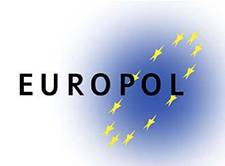
The European police service Europol has recently wound up an investigation into child pornography which lasted two years. Raids were made on houses in 20 countries. A total of 221 suspected pedophiles were discovered and 115 of them were arrested. Some of the suspects had jobs working with children. Victims of various nationalities were identified in the course of the investigation. The youngest was five.
Article 3 of 3
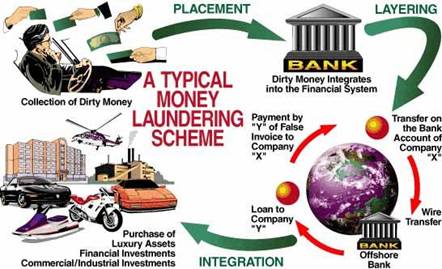
A report published by Associate Professor Aurelijus Gutauskas at Mykolas Romeris University's Law Faculty gives a very interesting insight into how the economic downturn has led to increased social disparities, crime, fraud and widespread shadow economy in Lithuania.
VilNews is presenting some of Professor Gutauskas' findings over three issues. This is our article number three:
Fraud
In 2009, 4229 cases of fraud were registered by law enforcement agencies, and 2494 more were registered between January and July 2010. In comparison with 2008 (when there were 2773 cases of fraud), there is an obvious increase in the commission of this kind of crime.
The economic crisis has affected many fields of business. Payments among the participants in an economy in disarray and a massive increase in mutual debts raise the probability of an increase in fraud crimes. Business difficulties stimulate the rise of new ways of perpetrating fraud, manipulation, shady financial transactions, and other forms of misappropriation. An increase of insurance fraud is also predicted. Companies that are going bankrupt, receiving no bank loans, and short of liquid assets will easily be attracted by offers of financial assistance or investment and will not investigate the source of the money. Analysis of investigations shows a trend of OCGs working to create favorable environment for acquiring legal businesses. By taking over insolvent companies and using them to launder the proceeds of crime, criminal groups would more easily be able to control a legal business. There has also been an increase in the number of fraud cases among legal entities. Companies are established or purchased in order to commit fraud, and commodities are purchased on the grounds of consignation. There are also cases of fraud in the recovery of VAT. Companies of this kind later go bankrupt or are illicitly sold to other persons, and further activity is undertaken. The persons who acquire them are usually antisocial, and trade is conducted using lost or stolen identity documents.
Corruption
Many law enforcement officers, prosecutors, and lawyers, at all levels and ranks, particularly those who specialize in tax cases, become corrupt. They set out to receive unlawful rewards from persons suspected of crimes against the financial system, who can avoid prosecution by paying bribes. If the bribe fails – that is to say, if the pre-trial investigation is not dismissed or the criminal act is not downgraded to a milder article of the criminal code – these persons make up charges and pay officers to intimidate or financially weaken their business competitors.
Those who participate in corruption in public tendering are persons who in the administrative field (officials of ministries, budgetary institutions, and municipalities), employees of public institutions, and managers of private companies or companies run by the state and municipalities. Aspects of corruption are noticed in all fields and stages of public tendering. Corrupt activity manifests itself most in the organization of public tendering regarding constructions, refurbishment, and information technologies.
Different corruption mechanisms are employed at each stage of public tendering. The initial stage includes one type of fraud. Representatives of companies participating in this procedure come to an informal agreement on a winner in a certain town, region, or ministry, and fix the price for services, commodities, or work. Agreements of this kind maintain high prices and stable income (the company knows how many tenders it will win each year). They also exclude possible competitors.
Money laundering
In order to launder money, foreign companies transfer their money to the accounts of fake foreign or Lithuanian companies that are usually established in Lithuanian banks by foreign citizens. Money is then transferred from one country to another through Lithuania financial institutions using the accounts of these fake companies. The proceeds of crime acquired in Lithuania may be transferred to foreign states, or the proceeds of crime in foreign countries may be transferred to Lithuania.
Lithuanian companies transfer money to the fake company or non-profit (usually fitness clubs), and the money is cashed immediately after it has been transferred. After the money has been cashed, fake accounts are opened and managed by antisocial citizens of both Lithuania and foreign countries who often have connections with criminal groups.
It is assumed that the major reason for transferring assets to Lithuania is to conceal the illegal origin of the assets. Nevertheless, cases have been discovered in which Lithuanian nationals used accounts in foreign countries while engaging in similar criminal activity.
Lithuanian companies increasingly use companies registered in foreign countries and foreign nationals to transfer money to the accounts of fake companies or offshore companies in foreign banks. More cases occur in which money is cashed in neighboring countries and in which the citizens of that particular country are involved.
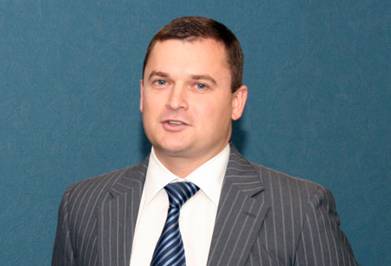
Former director of Lietuvos Pastas (Lithuanian Post) and Swedbank (Hanza) Leasing, Andrius Urbonas, was last year arrested for fraud. Urbonas was accused of having used his high position and connections in banking institutions to make loans to clients whose applications for loans were previously rejected. Authorities claim that he laundered money through the scheme. He denies the charges. A criminal case against him and other directors from Swedbank Leasing started in Vilnius District Court last week.
Sun, 29th May, 2011 - (1) Comment
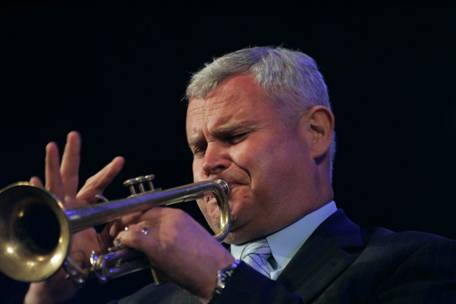
This weekend Klaipeda’s new Mayor, Vytautats Grubliauskas, greeted guests from Lithuania’s international community with jazz trumpet virtuosity, also singing Louis Armstrong’s ‘What a wonderful World’ very convincingly.
'The Singing Mayor' has introduced a completely new and refreshing sound into Lithuania's political life. A human face with a good ability to communicate with the audience through song and music. This bodes well and should be a source of inspiration for many!
Former U.S. President Bill Clinton became the world's most famous ‘jazz politician’, when he already during the election campaign in 1992 hit new tunes for U.S. politics, playing his tenor saxophone in a very convincing manner.
Lithuania has its own jazz politician through Klaipeda's newly elected mayor, VytautasGrubliauskas, who sings and plays trumpet in a top professional manner, latest for a large group from Lithuania's international community at an event in Klaipeda this weekend, when members of the British Chamber of Commerce in Lithuania took the road to the coast to a joint programme with the coastal city's international business organization.
The truth is that Mayor Grubliauskas for many years was one of Western Lithuania’s leading jazz musicians, known as the principal soloist of the Doudi Jazz Band from Klaipeda, famous for his trumpet playing and singing with a raspy voice that gave him the nickname ‘Lithuanian’s Louis Armstrong’. For many years Vytautas Grubliauskas shared his time and energy between performing and wide-ranging public activities, as a long-time president of the Klaipėda Jazz Club, Associate Professor and Head of the Jazz Department at the Klaipėda University, artistic and executive director of the Klaipėda Jazz Festival (now as a patron), and finally as a member of Seimas (Lithuania’s parliament) before winning the latest municipal elections and taking the post as Mayor of Klaipeda last month.
I have the suspicion that Mr. Grubliauskas will become internationally known as 'Lithuania’s Singing Mayor', after he introduced a completely new and refreshing sound into Lithuania's political life to the country’s international community this weekend. A human face with a good ability to community with the audience through song and music. This bodes well and should be a source of inspiration for many!
VilNews will revert with a comprehensive coverage of Klaipeda later in June, including an interview with the new Mayor, where we will be discussing politics, society, business, energy, tourism, culture and new visions for the coastal city and the region it is the capital for.
And for all of you who love jazz, please note that Klaipeda’s world famous Jazz Festival takes place the weekend of 3 – 5 June. If you are lucky also you may then be able to listen to ‘Lithuania’s Singing Mayor’!
Read more about the Jazz Festival at http://www.jazz.lt/festival/index.php?lang_id=2


A boat trip is a must when you visit Klaipeda. So also when members of the British Chamber of Commerce in Lithuania this weekend took the road to the coast for a joint programme with the coastal city's international business organization.
Tue, 24th May, 2011 - (0) Comment
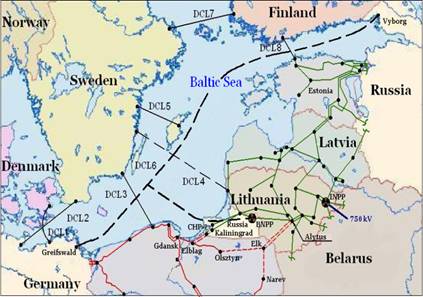
Energy infrastructure in the Baltic areas
By Aage Myhre, Editor-in-Chief
We described in yesterday's VilNews how the big powers France, Germany, Poland, and Russia now seem to be moving into a better climate of cooperation among themselves. We suggested in this context that Lithuania and the other Baltic States once again could become victims of the great powers' actions, and we recommended a much closer cooperation with the Nordic countries (Scandinavia) as the best and safest solution for Lithuania, Latvia and Estonia in the future. See also articles below.
The Baltic countries should, in my opinion, cooperate closely on a common approach to Scandinavia, and they should do their utmost to become independent of gas, oil and electricity from Russia – as soon as possible.
Lithuania already pays 40% more for gas bought from Gazprom than what Germany pays for the same gas, and there is little doubt that Russia is doing everything possible to prevent the Baltic States from developing their own energy sources. Russia has already taken a number of worrisome, significant steps to maintain and enhance its energy monopoly here.
The Baltic States may soon be even more squeezed and caught in a trap if the Nordic countries and the EU do not do more to help in achieving a much higher degree of independence from Russian energy.
The aspect of altered safety and balance in this region could easily be the next step, and we think the Baltic States, the Nordic countries and EU should look very carefully into this situation.
Here are two of the comments we have received to our yesterday's issue of VilNews:
|
|
Lithuania's hostile neighbourhood As an American, witnessing current American- Israeli discussions re: 1967 War boundaries. I would remain cautious about Obama's commitment to the Baltic nations. Kudos to Grybauskaite's remarks in 2010. Grybauskaite should be prepared to reiterate the need to validate past disclosures of US-NATO defense commitments to Lithuania, Latvia, Estonia. Just as there should be no illusions about the hostile neighborhood surrounding Israel, there must be no illusions re: Russian foreign policy affecting the Baltics and Poland. |
|
|
The true export of Russia is wholesale corruption, all-out cynicism
Aage, greetings. While in no way disputing the main thesis of your piece, I would like to supply a quick comment on its opening posit, concerning the "potential new alliance between France, Germany, Poland and Russia." Russia, I am afraid, is the odd man out in that suppositional constellation. It is, at present, a less than benign autocracy, and its economic model can only be described as unmitigated kleptocracy. 60-70% of its hard-currency revenue is due to oil and gas export, it is the world's third-largest international supplier of mineral resources, and so some of the more energy-dependent European countries, willy-nilly, exercise a cravenly "pragmatic" approach in their bilateral relations with Russia's ruling regime, agreeing to turn a blind eye even to some of its more blatant violations of human rights and economic freedoms. This is a country with no free elections, no freedom of press, no opposition figures ever allowed access to television; this is one of the most dangerous places on earth to be an independent journalist: the murder incidences among that category of people is very high indeed.
According to the Transparency International annual state-corruption ratings, Russia currently occupies the 154th spot out of the total of 178 on their: still ahead of Somalia, yet -- just as an example -- lagging behind Nigeria. And that's the true export of Russia, in the grand scheme of things: wholesale corruption, all-out cynicism. It is, in all, a shameful, thoroughly failed place, right now, I'm sad to say.
Tue, 24th May, 2011 - (1) Comment
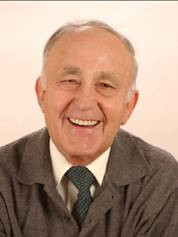
Dr. Stan Backaitis
Text: Dr. Stan Backaitis, P.E., SAE Fellow, USCBSC Consortium, member of CEEC
Russia can turn the lights out on Lithuania and the other two Baltic states any time it pleases. And they can't turn them back on without Russia’s permission. Not only does this small, central European nation, as well as its neighbors Latvia and Estonia, not have access to the Russian owned-switch, but, to a large extent, it also depends on energy supplies from Russia to power its electricity generating plants; power that is needed for energy and economic independence. Lithuania as well as the other Baltic countries, being poor in energy resources, are facing a tough future and are seeking solutions. What would you do?
Sun, 22nd May, 2011 - (4) Comment
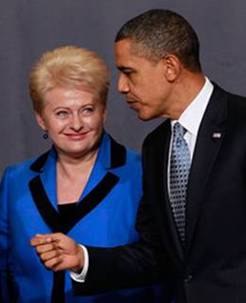
The president of Lithuania, Dalia Grybauskaite,
and president of the United States of America, Barack Obama.
USA's president, Barack Obama, visits Europe this week. Ireland, England, France and Poland are on his programmer on this trip to Europe, the 9th as U.S. president.
Obama's weeklong tour is all about tending to old friends in the Western alliance and securing their help with daunting challenges, from the political upheaval in the Mideast and North Africa to the protracted war in Afghanistan.
A priority for the president and his allies will be to more clearly define the West's role in promoting stability and democracy in the Arab world without being overly meddlesome and within tight financial limitations.
Sun, 22nd May, 2011 - (16) Comment

In a meeting in Bydgoszcz , Poland, last week, the foreign ministers of France, Germany and Poland agreed to an ambitious programme that includes pushing for tougher sanctions against Belarus, and for the European Union to establish its own civil and military planning headquarters independent of NATO.
The Foreign Ministers Alain Juppé of France, Guido Westerwelle of Germany and Radek Sikorski of Poland interspersed bonhomie with frank talk, showing how much relations have improved among the countries, after a past based on enmity and distrust.
The ministers said a European should be the next managing director of the International Monetary Fund after the resignation of Dominique Strauss-Kahn.
They also agreed that President Barack Obama’s speech delivered on Thursday on the Israeli-Palestinian conflict showed a link between changes sweeping the Middle East and a resolution to that intractable problem.
“The United States cannot do it alone,” Mr. Juppé said. “Europe must help.”
Mr. Westerwelle said: “The peace process affects what is happening in the Middle East. And what is happening in the Middle East affects the peace process.”
In another meeting, now in Klainingrad, Mr. Sikorski and Mr. Westerwelle for the first time held a trilateral meeting with their Russian counterpart, Sergei Lavrov. The meeting in Kaliningrad was part of an effort by the three countries to work together over political, security, energy and visa issues, and was viewed as a significant improvement in relations between Germany, Poland and Russia.
VilNews e-magazine is published in Vilnius, Lithuania. Editor-in-Chief: Mr. Aage Myhre. Inquires to the editors: editor@VilNews.com.
Code of Ethics: See Section 2 – about VilNews. VilNews is not responsible for content on external links/web pages.
HOW TO ADVERTISE IN VILNEWS.
All content is copyrighted © 2011. UAB ‘VilNews’.